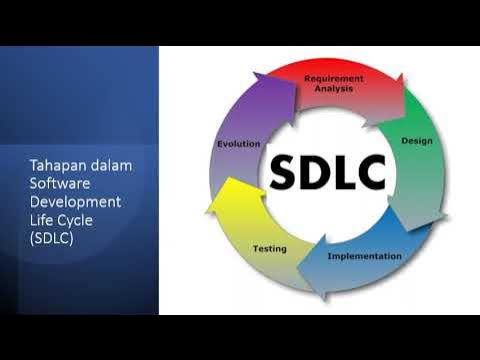SDLC (Software Development Life Cycle), Siklus Hidup Pengembangan Perangkat Lunak/ Rekayasa
Summary
TLDRThis video presentation offers a comprehensive overview of the System Development Life Cycle (SDLC), covering essential stages such as requirement analysis, planning, implementation, and maintenance. The team discusses the importance of each stage in ensuring that systems are developed efficiently and meet user needs. Key challenges, particularly in the analysis phase, are highlighted, with emphasis on the necessity of clear communication and documentation. Additionally, various SDLC methodologies, including Waterfall, Scrum, and Prototyping, are explored, along with their applicability in different types of projects. The session concludes with insights on best practices for successful system development.
Takeaways
- 😀 SDLC (Software Development Life Cycle) is a structured process used to create effective and efficient systems.
- 😀 The main stages of SDLC include Requirement Analysis, Planning, Implementation, and Maintenance.
- 😀 Requirement Analysis is critical for understanding user needs and system specifications through methods like interviews and documentation studies.
- 😀 Proper planning in SDLC ensures that the system is developed according to defined goals and that resources are effectively allocated.
- 😀 The Implementation phase involves coding, testing, and solving issues to build the system according to the design.
- 😀 The Maintenance phase is important for fixing bugs, enhancing features, and ensuring compatibility with new technologies after deployment.
- 😀 Different methods, like Waterfall, Scrum, and Prototyping, can be used in various SDLC phases depending on the project needs.
- 😀 Effective communication with users is crucial in Requirement Analysis to ensure that their needs are well understood and captured.
- 😀 A Business Requirement Document (BRD) can help ensure that both developers and users agree on system requirements and avoid scope creep.
- 😀 Challenges in SDLC often arise during Requirement Analysis, as user demands can change or be unclear, making it essential to gather detailed information.
- 😀 SDLC helps identify and address potential issues early in the development process, ensuring that the final system aligns with user expectations.
Q & A
What is SDLC and why is it important?
-SDLC (Software Development Life Cycle) is a structured process used to develop systems effectively and efficiently. It is important because it helps in identifying and resolving issues early in the development process, ensuring the system meets user needs and expectations.
What are the key stages of SDLC covered in the video?
-The key stages of SDLC covered in the video are: 1) Introduction, 2) Requirement Analysis, 3) Planning, 4) Implementation, and 5) Maintenance.
What methods are commonly used in the 'Analysis of Requirements' stage?
-In the 'Analysis of Requirements' stage, methods such as interviews, observations, and documentation studies are used to gather information about the system’s functional needs, expected performance, and other specifications.
Why is the 'Planning' stage critical in SDLC?
-The 'Planning' stage is critical because it defines the system's goals, allocates necessary resources, and sets up a clear project schedule. It ensures that the system is built according to the objectives and available resources.
How does the 'Implementation' stage contribute to SDLC?
-The 'Implementation' stage is where the system is actually built. It involves coding, testing, and debugging. This stage is crucial as it transforms the planned system into a working product, ensuring it meets the specified requirements.
What methods can be used during the 'Implementation' stage?
-During the 'Implementation' stage, methods like Waterfall, Scrum, and other project management approaches are used to guide the development process. These methods help in ensuring the system is developed correctly and tested thoroughly.
What is the purpose of the 'Maintenance' phase in SDLC?
-The 'Maintenance' phase ensures that the system continues to function smoothly after deployment. This phase involves bug fixes, performance improvements, and updates to keep the system compatible with new technology.
Why is the 'Analysis of Requirements' stage challenging?
-The 'Analysis of Requirements' stage is challenging because it involves gathering detailed information from users who may have evolving or unclear needs. It's important to ensure precise documentation to prevent future misunderstandings and scope changes.
What is a BRD and how does it help in the SDLC process?
-A BRD (Business Requirements Document) is a formal document that outlines the agreed-upon requirements between developers and users. It helps ensure that both parties have the same expectations, preventing scope changes or misunderstandings during development.
What types of projects can benefit from using SDLC?
-SDLC can be applied to a wide range of projects, including software development, application creation, and information system development. Any project that requires a structured development process can benefit from SDLC to ensure quality and efficiency.
What are some common SDLC models mentioned in the video?
-The video mentions several SDLC models, including Waterfall, Prototyping, and Agile (Scrum). Waterfall is a sequential approach, Prototyping is used for initial system development, and Agile (Scrum) is used for projects that require iterative improvements, such as mobile apps.
Outlines

このセクションは有料ユーザー限定です。 アクセスするには、アップグレードをお願いします。
今すぐアップグレードMindmap

このセクションは有料ユーザー限定です。 アクセスするには、アップグレードをお願いします。
今すぐアップグレードKeywords

このセクションは有料ユーザー限定です。 アクセスするには、アップグレードをお願いします。
今すぐアップグレードHighlights

このセクションは有料ユーザー限定です。 アクセスするには、アップグレードをお願いします。
今すぐアップグレードTranscripts

このセクションは有料ユーザー限定です。 アクセスするには、アップグレードをお願いします。
今すぐアップグレード5.0 / 5 (0 votes)






